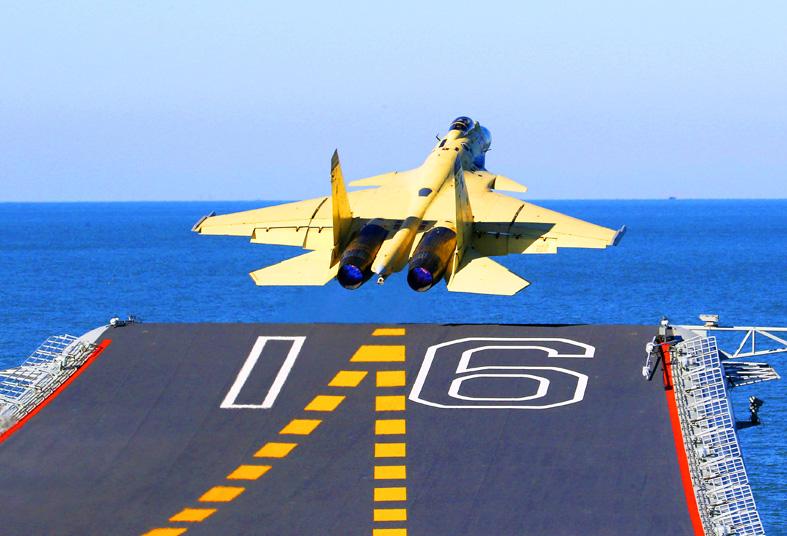From tomorrow, China legally requires foreign vessels entering what it considers to be its territorial waters to notify Beijing, creating what some fear is a “ticking time bomb” for conflict in the South China Sea.
The Standing Committee of the National People’s Congress in April amended China’s Maritime Traffic Safety Law (海上交通安全法) to require all foreign vessels entering Chinese territorial waters to inform maritime authorities, carry relevant permits, and submit to Chinese command and supervision.
It also gives Beijing the authority to instruct foreign vessels that “threaten the safety of Chinese internal or territorial waters” to leave and to exercise the “right of immediate pursuit.”

Photo: AP
According to the UN Convention on the Law of the Sea, territorial waters are defined as the 12 nautical miles (22.2km) of sea extending from terrestrial territory, with the “right of innocent passage” reserved for vessels moving through territorial waters in a manner that does not threaten the security of the coastal state.
The Chinese Maritime Safety Administration said in a statement that the new reporting requirement would apply to all submersibles, nuclear vessels and ships carrying radioactive or harmful substances, as well as any foreign vessels deemed to “endanger the maritime traffic safety of China.”
Reports should include the vessel’s name, call sign, current position, next port of call, estimated course and speed, nature of goods and loading capacity, it said.
Other nations are afraid that China’s exploitation of the law to expand the scope of “gray zone” conflict could become a ticking time bomb, said Su Tzu-yun (蘇紫雲), director of the Division of Defense Strategy and Resources at the Institute of National Defense and Strategic Research.
Beijing considers its maritime jurisdiction to encompass more than just its coastal waters, Su said.
This would include the 12 nautical miles of sea surrounding the artificial reefs it has constructed in the South China Sea, giving Beijing an excuse to respond to freedom of navigation exercises carried out by other nations, he said.
Taiwan Democracy Watch specialist Sung Cheng-en (宋承恩) said that he expects the impact on the Taiwan Strait to be slight.
Under the UN convention, waters between Taiwan and China are considered an international strait through which freedom of navigation “solely for the purpose of continuous and expeditious transit of the strait” is guaranteed.
However, Sung agreed that the amendment could affect US operations in the South China Sea, depending on how China’s coast guard chooses to enforce the law.

A Ministry of Foreign Affairs official yesterday said that a delegation that visited China for an APEC meeting did not receive any kind of treatment that downgraded Taiwan’s sovereignty. Department of International Organizations Director-General Jonathan Sun (孫儉元) said that he and a group of ministry officials visited Shenzhen, China, to attend the APEC Informal Senior Officials’ Meeting last month. The trip went “smoothly and safely” for all Taiwanese delegates, as the Chinese side arranged the trip in accordance with long-standing practices, Sun said at the ministry’s weekly briefing. The Taiwanese group did not encounter any political suppression, he said. Sun made the remarks when

PREPAREDNESS: Given the difficulty of importing ammunition during wartime, the Ministry of National Defense said it would prioritize ‘coproduction’ partnerships A newly formed unit of the Marine Corps tasked with land-based security operations has recently replaced its aging, domestically produced rifles with more advanced, US-made M4A1 rifles, a source said yesterday. The unnamed source familiar with the matter said the First Security Battalion of the Marine Corps’ Air Defense and Base Guard Group has replaced its older T65K2 rifles, which have been in service since the late 1980s, with the newly received M4A1s. The source did not say exactly when the upgrade took place or how many M4A1s were issued to the battalion. The confirmation came after Chinese-language media reported

The Taiwanese passport ranked 33rd in a global listing of passports by convenience this month, rising three places from last month’s ranking, but matching its position in January last year. The Henley Passport Index, an international ranking of passports by the number of designations its holder can travel to without a visa, showed that the Taiwan passport enables holders to travel to 139 countries and territories without a visa. Singapore’s passport was ranked the most powerful with visa-free access to 192 destinations out of 227, according to the index published on Tuesday by UK-based migration investment consultancy firm Henley and Partners. Japan’s and

BROAD AGREEMENT: The two are nearing a trade deal to reduce Taiwan’s tariff to 15% and a commitment for TSMC to build five more fabs, a ‘New York Times’ report said Taiwan and the US have reached a broad consensus on a trade deal, the Executive Yuan’s Office of Trade Negotiations said yesterday, after a report said that Washington is set to reduce Taiwan’s tariff rate to 15 percent. The New York Times on Monday reported that the two nations are nearing a trade deal to reduce Taiwan’s tariff rate to 15 percent and commit Taiwan Semiconductor Manufacturing Co (TSMC, 台積電) to building at least five more facilities in the US. “The agreement, which has been under negotiation for months, is being legally scrubbed and could be announced this month,” the paper said,